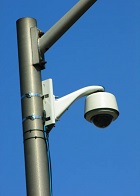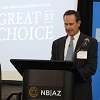 With the recent bombing at the Boston Marathon there has been a lot of talk in the media the past week about video surveillance and security. The talk ranges from whether we need more video surveillance cameras to increase security and prevent future attacks to a concern about the Government watching our every move and further stepping on our civil liberties.
With the recent bombing at the Boston Marathon there has been a lot of talk in the media the past week about video surveillance and security. The talk ranges from whether we need more video surveillance cameras to increase security and prevent future attacks to a concern about the Government watching our every move and further stepping on our civil liberties.
The role of government, the primary role of our government, is to provide protection against foreign aggression. Most people would agree that our government has done a very good job of stopping further large-scale terrorist attacks since 9/11. Our airports, harbors and mass transit systems are very heavily protected through the deployment of personnel and technology. To call for the government to go further and deploy video surveillance in every major city is an open invitation to creating a police state. That is not the answer. The role of citizens in a democratic society is to participate in public life. That means we, the citizens, are obligated to be informed about public issues, carefully watch how our elected officials and how they use their powers, and to voice our own opinions and interests. It was the citizens of Boston – the business video surveillance system, residence and visitors using smart phones – that provided the information and images that lead to the identification and ultimate capture of the attackers.
In this conversation, it is important to understand video surveillance and how the technology functions. Video surveillance systems provide for continuous viewing of live images and storage of recorded events. Continuous viewing, watching what is happening as it happens, requires a constant set of human eyes on the cameras to see and identify potential threats. Viewing recorded events can be done anytime from almost anywhere, but are rarely needed [or viewed] until after an event – crime, attack, etc. Video surveillance is a very effective deterrent and valuable for providing information and images after the fact. The truth is video surveillance, by itself, does not stop attacks and will not stop foreign or domestic aggression. Video surveillance, coupled with other technologies and the watchful, alert and informative citizens will help spot potential attacks and provide the information and identification needed to stop or apprehend attackers.
 So, is more video surveillance the answer? If we are looking for one technology to keep us completely safe, then no, more video surveillance isn’t the answer. However, if we are looking to enhance our own security and provide government authorities with helpful information about crimes against the citizens of the United States, then more video surveillance, in the hands of citizens is part of the answer.
So, is more video surveillance the answer? If we are looking for one technology to keep us completely safe, then no, more video surveillance isn’t the answer. However, if we are looking to enhance our own security and provide government authorities with helpful information about crimes against the citizens of the United States, then more video surveillance, in the hands of citizens is part of the answer.
-David Murphy shares his expertise and experience on security issues for individuals, families and businesses. He is the founder and CEO of Xpress Protection Security Solutions and a featured SmartFem Expert



















I’m not so sure more surveillance is really necessary. As the article pointed out, smart phones were used to aid in tracking down the Boston suspects. On a personal level, though, having more security cameras gives me some peace of mind.
I think Yes more surveillance is needed, when applied in the proper way. This is a great example of how surveillance and community should work. The video footage of the suspects in Boston was obtained by Business security systems who in the process of securing their own business was able to assist the community in not only identifying but capturing the suspects. No we do not need government surveiling every thing we do. good article
Dennis Neftleberg
http://cctvlongisland.com